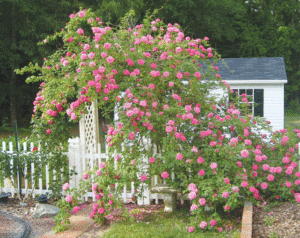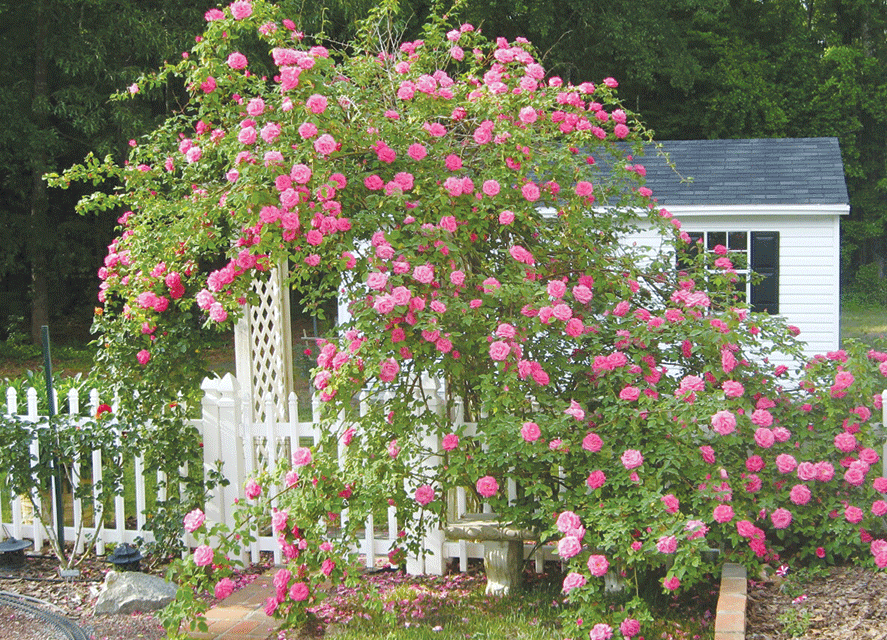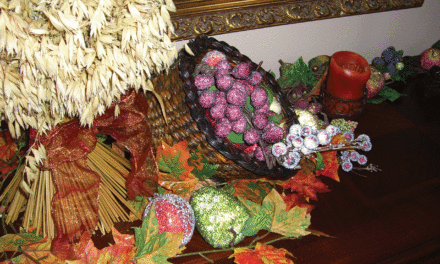
“Zephirine Drouhin,” a medium pink from the class of Bourbon Old Garden roses, is Beulah Bonneville’s favorite rose. (Photo courtesy Beulah Bonneville)
Roses have a checkered history with home gardeners, leading many to chalk them up as more trouble than they’re worth.
“That’s because for years, the rose industry focused on the perfect bloom and forgot all about drought resistance, disease and fragrance,” said Chris Van Cleave, who is known as the Redneck Rosarian and is one-half of “The Rose Kings,” a gardening partnership of himself and Brian Plunkett, curator of the first municipal-sponsored Earth Kind Rose trial in Helena, Ala.
Together, they “have launched a national tour to educate the public and how they can achieve the rose garden of their dreams without using harmful chemicals.”
On this year’s Leap Day, that tour landed at this year’s Maryland Home & Garden Show, where Van Cleave and Plunkett gave a talk with tips on how to plant and care for roses in your garden along with a second talk, which included suggestions on rose varieties that work well in the Mid-Atlantic region.
The Rose Kings emphasized that successful rose growing depends on making critical decisions before you even buy the plants, including determining if your garden has the right conditions for growing roses.
Those conditions include three critical components: location, drainage and soil.
For location, most home gardeners are probably aware that roses like sun. In fact, “roses like a lot of sun,” Plunkett said, “as they use it to get the energy they need to put out their bloom.”
Roses also need good drainage. “Roses love water, but cannot swim,” said Plunkett, and noted that if your soil doesn’t drain adequately you will need to put in organic additives to soak up the water and facilitate that good drainage.
Plunkett then described a simple test to determine if the location you’ve picked out for your roses has the requisite drainage they’ll need. First, dig a hole at least the size of the pot you anticipate planting and pour enough water in it to soak it well. With the hole soaked, pour an additional gallon of water in the hole. If that water is gone after 15 minutes, then your chosen location has the requisite good drainage. If there’s still water in the bottom of the hole after 30 minutes, then you should either move on and consider another location or decide whether you can put in adequate organic additives to soak up the water.
Last, of course, is soil. The Rose Kings suggest that you not only test your soil initially, but also every couple years afterwards.
“The cool thing about soil tests,” said Van Cleave, “is you tell them what you’re growing and they’ll tell you what you need to do. It’s like a soil course by mail.”
To get a soil test, you should check with your county’s Extension service to find out what you need to do. For instance, the Maryland Department of Agriculture works in cooperation with the University of Maryland Extension’s Home & Garden Information Center to facilitate information on soil testing. (Go to www.extension.umd.edu/hgic/soils/soil-testing for soil test information.)
Even with those three critical elements in place, “I tell all the gardeners I work with, you cannot expect a rose to grow without any care or any problems at all,” said Beulah Bonneville, who is a Consulting Rosarian for the American Rose Society. “You need to know what they delight in and what they don’t.”
For instance, in addition to reiterating The Rose Kings’ advice of a sunny location, Bonneville recommended home gardeners in the Mid-Atlantic region look for a location where the rose can quickly dry off in the morning.
She also pointed out that home gardeners need to consider the mature spread of any particular variety. Toward that end, Van Cleave reminded home gardeners the term “‘miniature’ refers to the size of the bloom, not the size of the shrub.”
Finally, along with The Rose Kings, Bonneville suggested home gardeners “don’t plant a monoculture of roses, but a balance of plants so you have good bugs taking care of the bad bugs.”
Van Cleave agrees and suggested a number of perennials, which both bring “extra color into the garden to complement your roses, and attract beneficials that eat the bad guys.”
“The culture of any plant is learning what it needs and providing it,” said Bonneville. “With a little bit of reasonable effort, a rose will reward you with a full season of bloom.”





